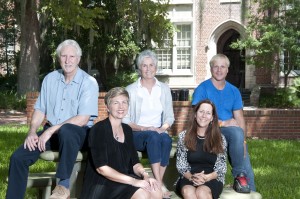
UF principal investigators on active federal IES grants, pictured from left, are Stephen Smith, Mary Brownell, Ann Daunic, Maureen Conroy and Joseph Gagnon. (PIs Cynthia Griffin and Patricia Snyder were unavailable for group photo; they are pictured below.)
Faculty researchers in the University of Florida’s special education program, ranked fourth nationally, have built an impressive track record for winning large, highly competitive grants from the Institute of Education Sciences, the research arm of the U.S. Education Department.
College of Education researchers in early childhood and special education recently received two IES grants worth a combined $5.5 million, supporting two studies aimed at reducing problem behaviors and improving the classroom learning environment. UF professor Maureen Conroy, working under a $4 million award, is examining the efficacy of an experimental intervention in early learning settings—called BEST in CLASS—that showed high promise in a preliminary study. The second grant, worth $1.5 million, supports professors Stephen Smith and Ann Daunic who are developing a lesson series teaching middle school students with significant behavior problems techniques to control their emotions and behavior in social situations.
“Grants awarded by the Institute of Education Sciences are selected because they are the most innovative, important and well-designed projects in a huge pool of applications,” says Jonathon Shuster, a faculty research professor with UF’s Institute for Child Health Policy. “These studies are large in scope with potentially huge payoffs. If new generalized ways can be found for interventions, the investment will be returned thousands of times over by translating these methods to the nation.”
These two latest awards raise the total number of IES grants held by UF special education faculty in 2011 to eight—worth a combined total of more than $15 million. Smith and Daunic recently completed another $1.6 million intervention study that helps students deal with aggressive behavioral issues in the classroom. Supported by a $2 million award, Mary Brownell and colleagues in Colorado and California have developed research-proven professional development packages to help practicing teachers advance their literacy instruction skills for students with learning challenges. Brownell, Smith and Daunic have documented the positive impacts of their respective studies on student reading achievement and behavior.
Four other IES grants active in 2011, each worth about $1.5 million, support other vital projects in special education:
— Daunic, Smith and Nancy Corbett are developing a reading curriculum that combines storybook reading techniques with social stories to encourage students’ critical thinking about managing their emotions and behavior;
— Joseph Gagnon and Holly Lane are evaluating new literacy instruction and professional development methods for helping teens in juvenile corrections facilities improve their reading skills while they are incarcerated;
— Cynthia Griffin and co-investigators Stephen Pape (mathematics education) and Nancy Dana (teacher leadership for school improvement) are developing an online professional development program for elementary school math teachers serving students with learning disabilities.
— And, in studies involving seven institutions, UF’s Patricia Snyder and co-researchers are documenting the effectiveness of new professional development packages focused on preschool teachers’ use of embedded-instruction practices and the impact of social and emotional influences on early learning.
CONTACT:
Writer: Larry Lansford, News & Communications, UF College of Education, llansford@coe.ufl.edu; (352) 273-4137

